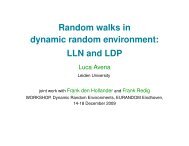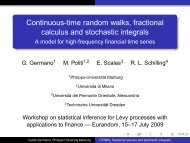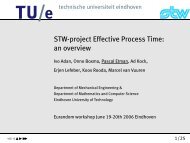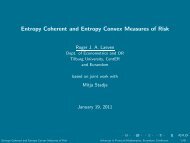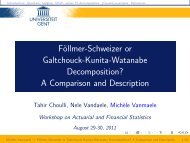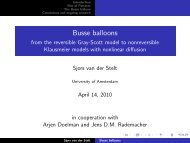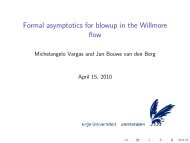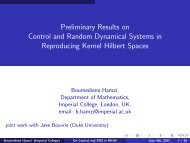EURANDOM
EURANDOM
EURANDOM
Create successful ePaper yourself
Turn your PDF publications into a flip-book with our unique Google optimized e-Paper software.
Spain (3) and Austria (1). There was also a good mix in seniority and background (climate studies, statistics).<br />
During this workshop, the presentations lead to fruitful discussions and interaction. People from climate<br />
studies have learned about recent developments in the field of extreme value theory that are<br />
highly relevant for them. People from statistics have learned about the statistical problems people in<br />
climate research are confronted with. <strong>EURANDOM</strong> and KNMI see possibilities in starting joint projects<br />
on statistical approaches to problems in climate studies.<br />
Sponsors:<br />
Royal Netherlands Meteorological Institute (KNMI), Mathematical Research Institute (MRI), Netherlands<br />
Organization for Scientific Research (NWO), Thomas Stieltjes Institute for Mathematics, NWO Earth and<br />
Life Sciences (ALW).<br />
June 8-10, 2010 (SIM)<br />
Parameter Estimation for Dynamical Systems<br />
Organizers:<br />
Chris Klaassen, Universiteit van Amsterdam & <strong>EURANDOM</strong><br />
Shota Gugushvili, <strong>EURANDOM</strong><br />
Bart Bakker, Philips Research<br />
Participants: 50<br />
There were eight presentations by invited speakers, seven contributed talks, a poster session with eight<br />
posters, and a panel discussion on present state and future of the field.<br />
Systems of ordinary differential equations (ODEs) play an important role in modelling various phenomena<br />
that arise in fields as diverse as biology, engineering, chemistry, meteorology, and many others.<br />
Typically, these systems are nonlinear and depend on parameters. For instance, in biomolecular applications<br />
these parameters describe interaction rates and initial concentrations of various molecules relevant<br />
to a given biomolecular process. In order to obtain a model useful in practice, it is critical to know<br />
these parameters. They have to be inferred from data related to the process at hand. Typically, the dimensions<br />
of both the ODE system as well as the parameter space are high, while data are relatively<br />
scarce. Hence estimation of parameters of ODE systems is a challenging problem that lies at an intersection<br />
of several theoretical and applied fields. The workshop has been very successful in providing a<br />
meeting place for researchers in the area, who reviewed different methods used to tackle the problem,<br />
assessed the achieved progress, and identified future research directions.<br />
Classical Least Squares Estimation was discussed by Piet Hemker, the Bayesian approach by Dave Lunn<br />
and Dave Campbell, smoothing techniques by Jim Ramsay and former <strong>EURANDOM</strong>-postdoc Nicolas<br />
Brunel, a nonlinear programming approach by Victor Zavala, and applications by Kim McAuley. A general<br />
overview was given by Eberhard Voit. The contributed papers and posters also touched on several<br />
of these topics. It was a good mixture of theoretical and more applied contributions for an audience<br />
and by speakers with diverse backgrounds.<br />
The workshop has drawn attention to this new field, has been very informative for the participants,<br />
and has fostered collaboration by its pleasant and inspiring atmosphere.<br />
Publication of proceedings in a journal is under discussion. A follow-up workshop might be planned in<br />
two years.<br />
Sponsors:<br />
Royal Netherlands Academy of Arts and Sciences (KNAW), Netherlands Bioinformatics Centre (NBIC),<br />
Netherlands Organization for Scientific Research (NWO), Philips.<br />
June 25 & 26, 2009 (QPA)<br />
SPOTNET meeting<br />
Organizers:<br />
Seva Shneer, <strong>EURANDOM</strong><br />
<strong>EURANDOM</strong> Annual Report 2009 27


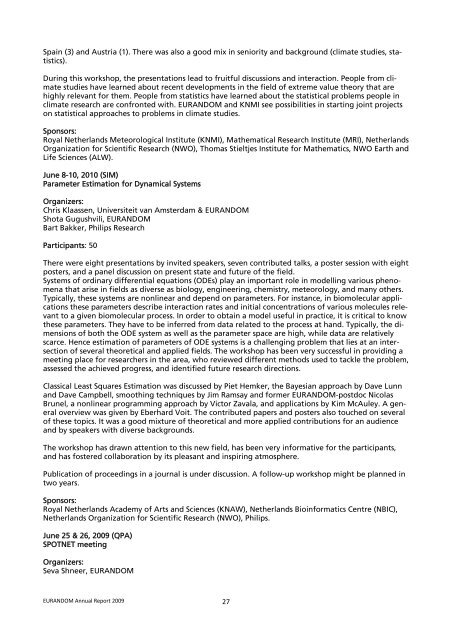
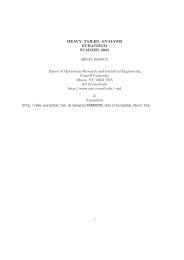
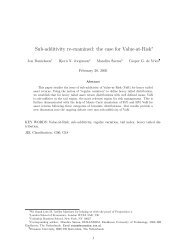
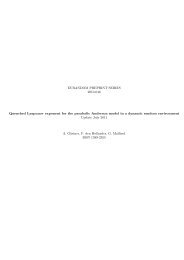
![The Contraction Method on C([0,1]) and Donsker's ... - Eurandom](https://img.yumpu.com/19554492/1/190x143/the-contraction-method-on-c01-and-donskers-eurandom.jpg?quality=85)
